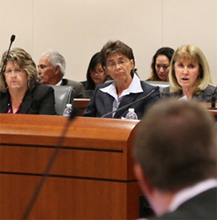Council Tackles Fallout From Budget Reductions
Contact: <a href="mailto:blaine.corren@jud.ca.gov">Blaine Corren</a>, 415-865-7740
April 17, 2015
Council Tackles Fallout From Budget Reductions
Members vote to cut programs funded by a special state improvement fund; agree to modify allocation method for pass-through funds targeted to dependency counsel

SAN FRANCISCO—At its public meeting on April 17, the Judicial Council approved recommendations to address an anticipated shortfall of nearly $11 million in the judicial branch’s State Trial Court Improvement and Modernization Fund (IMF) for fiscal year 2015–2016, reducing or eliminating funding for certain judicial branch programs and services.
The council also approved recommendations from its Trial Court Budget Advisory Committee to change the way it allocates annual funding for court-appointed dependency counsel, and to roll out the new allocation method over a four-year period. Funding for dependency counsel is provided by the state, but the allocation method approved for disbursing those funds to each court was created by the Judicial Council eight years ago. Speakers supporting and opposing the change to the council did agree on one thing: State funding for court-appointed dependency counsel is inadequate. The budget advisory committee and the council’s Family and Juvenile Law Advisory Committee will conduct a review of the dependency counsel workload methodology and report back to the council on recommended changes.
To deal with the shortfall in the IMF, the budget advisory committee developed its recommendations based on multiple factors, such as if the programs are mandated, their value based on a survey of the courts and the number of courts served, and the impact reductions would have on individual courts and the judicial branch.
Council members lamented the need to cut services supported by the IMF, such as court security grants and education programs, with many expressing concern about cutting the program that helps trial courts with dedicated complex civil litigation departments.
“We all understand the value, not only of complex civil litigation, but of all the statewide programs being cut,” said Chief Justice Tani G. Cantil-Sakauye, chair of the Judicial Council. “But I believe that this is an interim solution, and that this discussion had to happen here. This is the role of the Judicial Council.”
To help address the concern over the elimination of special-use funds for complex civil litigation, the council amended the recommendations by directing Judicial Council staff to propose an interim workload weight for complex civil cases, which would be reviewed by the budget advisory committee.
Other items on the meeting agenda included:
Declaration of San Pedro Courthouse as Surplus Property: The council approved a recommendation to declare the San Pedro Courthouse as surplus property and directed staff to obtain the Legislature’s authorization to dispose of the surplus facility. The Superior Court of Los Angeles County closed the courthouse in June 2013 and has no plans to reopen it. The county has indicated an interest in purchasing the property from the state court system.
Request to Lease Plumas-Sierra Courthouse: The council approved a recommendation to lease the Plumas-Sierra Courthouse to a third party to help reduce judicial branch facility expenditures. The superior courts in Plumas County and Sierra County closed the shared-use facility due to current budget constraints, but would like the option to reopen it in the future. The City of Portola and the Long Valley Charter School have indicated interest in leasing the facility.
An archived audiocast of the entire meeting broken out by topic will be available on the April 17 council meeting webpage later this week.
###
